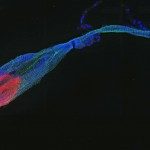Lien vers Pubmed [PMID] – 25706942
PLoS ONE 2015;10(2):e0118597
Buruli ulcer is an emerging and neglected tropical disease caused by Mycobacterium ulcerans. Few cases have been reported so far in the Americas. With 250 cases reported since 1969, French Guiana is the only Buruli ulcer endemic area in the continent. Thus far, no genetic diversity studies of strains of M. ulcerans from French Guiana have been reported. Our goal in the present study was to examine the genetic diversity of M. ulcerans strains in this region by using the Multilocus Variable Number Tandem Repeat Analysis (MLVA) approach. A total of 23 DNA samples were purified from ulcer biopsies or derived from pure cultures. MVLA was used in the study of six previously-described Variable Number of Tandem Repeat (VNTR) markers. A total of three allelic combinations were characterized in our study: genotype I which has been described previously, genotype III which is very similar to genotype I, and genotype II which has distinctly different characteristics in comparison with the other two genotypes. This high degree of genetic diversity appears to be uncommon for M. ulcerans. Further research based on complete genome sequencing of strains belonging to genotypes I and II is in progress and should lead soon to a better understanding of genetic specificities of M. ulcerans strains from French Guiana.

